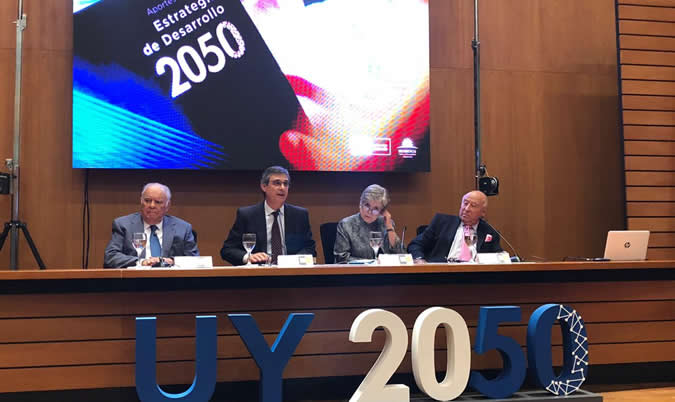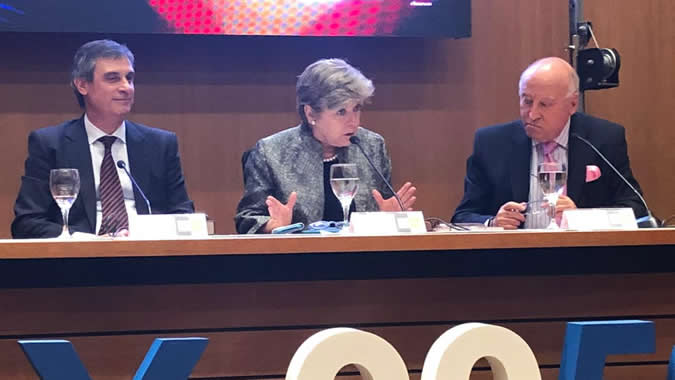Uruguay Presented its National Development Strategy through 2050, with Support from ECLAC
The Executive Secretary of the United Nations regional commission, Alicia Bárcena, participated in the event to launch the initiative on August 27 in Montevideo.

Uruguay’s government presented its National Development Strategy to 2050, which lays the foundations for that country to move towards sustainable development, in a ceremony held in Montevideo with the participation of the Executive Secretary of the Economic Commission for Latin America and the Caribbean (ECLAC), Alicia Bárcena.
The Strategy puts together an extensive set of long-term opportunities for the country, which were identified with the collaboration of hundreds of experts from state entities, business chambers, social and trade-union organizations, academia, and international organizations including ECLAC.
Its conclusions are articulated with the construction of short- and medium-term policies on production matters.
The presentation of this document was led by Álvaro García, Director of Uruguay’s Planning and Budget Office; Alicia Bárcena, ECLAC’s Executive Secretary; Enrique Iglesias, CEO of Fundación Astur; and Luis Enrique García, co-chair of the Ibero-American Council for Productivity and Competitiveness.
During the ceremony, ECLAC’s Executive Secretary congratulated Uruguay’s government for the important step of producing a National Development Strategy to 2050, “and for demonstrating that it is possible to extend the time horizon of our views towards a feasible and desirable future for our countries that entails development with greater equality and sustainability.”
She added that planning today goes beyond borders. “We have to understand what is happening at a regional and global level, and how we can achieve the 2030 Agenda, which is encouraging all our countries to incorporate the 17 Sustainable Development Goals into planning and budgeting,” she stated.
Alicia Bárcena indicated that 21st century planning is associated with critical thinking, the construction of national density, and an openness to trade and to the financial world that is not unconditional. “This requires political consensus and agreements,” she sustained.
Furthermore, she reaffirmed that equality is not just an ethical principle regarding justice and rights; it is also a factor in economic efficiency. In addition, she urged for putting an end to the culture of privileges that naturalizes inequality in the region.
The senior United Nations official noted that, “these days, even the most orthodox of thinkers recognize that we must equalize to grow – it is not enough to grow to equalize – because this is the only way we will achieve sustainable and sustained growth, with decent, well-paid work and access to social security.”
She highlighted that ECLAC is further developing the “big push” concept of Rodstein and Rodan (1960) by applying it to environmental sustainability, in order to produce an “environmental big push” as an economic growth strategy consisting of the articulation of a large number of public and private investments that should be made simultaneously in strategic sectors such as energy, transportation and productive reforestation, among others.
“That push can take different forms and be based on instruments of different sorts, from subsidized financing and tax incentives to the regulation of technological standards and the promotion of capital formation. This is a proposal to grow differently, with inclusion, equality and sustainability,” she said.
Meanwhile, Álvaro García stressed the collective effort made during the process to draft the Strategy and emphasized his conviction that no profound changes can be made if society has no collective vision.
“With this document we are presenting today, we are not seeking to put an end to the debate, on the contrary. We must all build the future together and what is most important is that we start building it now,” he stated.
In his remarks, Enrique Iglesias praised the Uruguayan process and contended that “the world faces big challenges today, and many of the institutions that we built upon in the last 50 years are starting to founder.”
However, he said, Uruguay has the right conditions to be able to implement it.
Luis Enrique García, meanwhile, stressed that “development is not a question of isolated parts, development is a set of elements relating to macroeconomic equilibrium, efficiency, equity and environmental equilibrium.”
In the framework of her visit to Uruguay, ECLAC’s Executive Secretary led the XVI Conference of Ministers and Heads of Planning and the XVII Meeting of the Regional Council for Planning, which were held on August 28-30 in Montevideo.
Related content

La igualdad no es solo un principio ético, de justicia y de derechos, sino que es un factor de eficiencia económica: Alicia Bárcena
En el marco de una visita a Uruguay, la Secretaria Ejecutiva de la CEPAL participó hoy en la presentación de la Estrategia Nacional de Desarrollo de ese país hacia 2050.
Contact
Public Information Unit
- prensa@cepal.org
- (56 2) 2210 2040